Film Study: A Christmas Carol (various)
A brief look at three permutations of the holiday classic.
Introduction
Charles Dickens’ A Christmas Carol is an immortal classic because it can warm the icy hearts of even the most inverted of gentlemen. For Christmas I thought it would be fun to look at this novella and a few of its adaptations to the big screen. Because there are so many movie versions, I am limiting myself to three: the earliest adaptation, the most highly regarded adaptation and my personal favorite adaptation. I think everyone is familiar with the story, but let us recap it all the same.
Jacob Marley is dead. We meet his partner, the miserly Ebenezer Scrooge, at his place of business. Here, Scrooge has three important interactions.
First, his lone employee, Bob Cratchit. The man is overworked and underpaid. He must warm his hands on a candle because his boss refuses to pay for coal. He is given Christmas as a paid holiday, but Scrooge gripes and groans about it: “A poor excuse for picking a man’s pocket every twenty-fifth of December…But I suppose you must have the whole day. Be here all the earlier next morning.”
Second, Scrooge's nephew, Fred, pays a visit. He asks his uncle to a Christmas dinner. The old miser refuses, and the two argue about the meaning of Christmas. Fred says, “‘There are many things from which I might have derived good, by which I have not profited, I dare say,’ […] ‘Christmas among the rest…And therefore, uncle, though it has never put a scrap of gold or silver in my pocket, I believe that it has done me good, and will do me good; and I say, God bless it!’”
Finally, a pair of portly gentlemen entreat Scrooge for a charitable donation. He tells them he already supports prisons and workhouses; let the poor go there. But many can’t or would rather die, says one of the men. Scrooge replies, “If they would rather die, they had better do it, and decrease the surplus population.”
Later that night, the ghost of Jacob Marley visits Scrooge. Dragging chains behind him, Marley warns Scrooge to change his ways less he be doomed. To facilitate this change, Marley sends the three spirits of Christmas: Past, Present and Yet to Come.
The Ghost of Christmas Past shows Scrooge three scenes. The first is of his sister, Fran, coming to bring young Scrooge home from a boarding school. Fran would later die, but not before birthing Fred. The second is of a Christmas party held by Scrooge's former employer, Fezziwig. The party costs a bit, but the merriment is more than worth it. The third is of Belle breaking off her engagement to Scrooge. She says, “I have seen your nobler aspirations fall off, one by one, until the master passion, Gain, engrosses you.”
These three scenes relate to the three opening interactions in one way or another. The affection Scrooge feels for Fran contrasts with the disdain he feels for her son. Fezziwig’s generous nature (toward his employees in particular) is a far cry from Scrooge’s miserly attitude. Scrooge’s love for money eclipses his ability to love others, as evidenced by his failed relationship with Belle and his interaction with the two charity collectors.
The Ghost of Christmas Present also shows three related scenes. The Cratchits are poor but grateful. Bob Cratchit even toasts Scrooge. The youngest Cratchit boy, the disabled Tiny Tim, moves Scrooge with his kindness and courage in the face of adversity. Meanwhile, Fred is having a blast at his party. He says he will invite his uncle every year because he pities him; Fred understands that Scrooge’s mean ways are a detriment only to himself. Lastly, Scrooge sees Belle married and with children - a life he could have had.
The Ghost of Christmas Yet to Come shows Scrooge a series of scenes revolving around an unknown man's death. This man is disrespected by his colleagues. His corpse is looted by robbers. The only people who show any emotion for his passing are a poor couple who celebrate it: they are, temporarily anyway, freed from the debt they owed him. The vexed Scrooge asks the spirit to show him tenderness in relation to death. Thus, he is conveyed to the Cratchit home where they mourn the passing of Tiny Tim. It is finally revealed that the unknown dead man is Scrooge himself.
In light of these revelations, Scrooge vows to keep Christmas in his heart throughout the year. He wakes up on Christmas day and makes amends with the people he hurt. He gives the charity collectors a generous donation, attends Fred’s party and becomes a second father to Tiny Tim.
Scrooge; or Marley’s Ghost (1901)
This is the earliest adaptation, filmed in 35mm and in black and white. It stars Daniel Smith and is directed by Walter R. Booth. It was probably based on a stage adaptation by J. C. Buckstone rather than Dickens’ novella.
The version I saw was about 6 minutes long. There is no sound, whatsoever; not even music. The story is told through intertitles, but these are scarce enough. Booth and the producer R. W. Paul relied on audiences’ familiarity with the story. As such, this is more of a companion to the book rather than a freestanding bit of entertainment.
Bob Cratchit and Scrooge are evidently having an argument (probably, “Be here all the earlier next morning.”) Later, Marley’s face appears on the door knocker. For its time, this was a well-executed special effect. Marley then shows Scrooge scenes from his youth. Booth had the past scenes superimposed on a black curtain hung in Scrooge’s room. Again, an impressive film trick for its time. Next, Marley escorts Scrooge to the homes of Bob Cratchit and Fred where they drink to his health. Finally, Scrooge is shown his own grave.
The film is shot like a junior high school play being recorded by one of the children’s fathers. The set looks almost as good. And the titular Marley’s ghost is a man literally draped in a white sheet. Even in 1901 I should think Booth could have done better than that!
Despite its shortcomings, Scrooge; or Marley’s Ghost was an impressive undertaking. A better adaptation was produced at Edison Studios in 1910 and directed by J. Searle Dawley. It used the same techniques used in the earlier film.
A Christmas Carol (1951)
This version of the tale is directed by Brian Desmond Hurst and stars Alastair Sim. It is regarded as the best, particularly among older audiences who grew up with it. A friend of mine nearing 70 reports it used to be simulcast with a radio play adaptation as well.
The movie follows the novella almost to the letter. It diverges chiefly by adding scenes to Scrooge’s past that further delineate his character and create more emotional weight. To the later point, we see Scrooge kneeling at Fran’s bedside in her final moments. Fran pleads with her brother to look after Fred, a plea we know fell on deaf ears.
More importantly, Scrooge is corrupted by an unscrupulous businessman named Jorkin (Jack Warner). It is Jorkin who starts Scrooge down the path of unbridled greed and ruthless business tactics. It culminates in Scrooge's betrayal of Fezziwig. This is a startling development given how much Scrooge loved his former boss.
It is one of the best acted adaptations I have seen. Particularly noteworthy is Michael Hordern as Jacob Marley whose scream is the only one that can be honestly called blood curdling. His performance is accentuated by superbly executed sound effects. In the novella, Marley’s coming is foretold by the ringing of bells and the clamor of chains. Hurst and his sound crew bring Dickens’ audial descriptions to life.
One unwelcomed change is the romantic subplot with Alice (i.e., Belle in the original). The past version of her remains the same, but in the present, she is not shown with a husband and children. Rather, she becomes a caregiver to the poor. This, in my opinion, diminishes Scrooge’s loss.
Scrooged (1988) [Rent it here.]
This delightfully demented and modern reimagining is directed by Richard Donner and stars the legendary comedian Bill Murray. It is my favorite adaptation because it hits all the same beats while being an original story with original characters. Every scene is a riot. It is also told with a New York flair: carolers are now street musicians; the Ghost of Christmas Past is a reckless cab driver.
Francis Xavier Cross is the youngest network president in television history. His meteoric rise is due to a manic devotion to his career. Like Scrooge, Frank mistreats his employees. He takes delight in firing Elliot Loudermilk days before Christmas. His secretary is given a towel in place of her bonus. Late one night while at his office Frank is visited by the ghost of his former boss, Lew Hayward (John Forsythe), who sets up the familiar redemption arc.
This first visitation scene exemplifies what I mean by same beats but different story. Frank dismisses the ghost: “You are a hallucination brought on by alcohol…Russian vodka poisoned by Chernobyl.” This is a clever take on the original’s “There’s more of gravy than of grave about you, whatever you are!” Hayward also delivers a variation of the “Mankind was my business” line. Other examples will become apparent.
The Christmas Past sequence is primarily concerned with Frank's relationship with Claire Phillips (Karen Allen). They fall in love, but Frank prioritizes his career over her. Claire is compelled to dump him. Back in “normal” time, Frank visits Claire at a homeless shelter that she operates. The two are foil characters: he is selfish, she is giving. Claire’s giving nature is exactly what Frank finds so irresistible about her.
Frank tries to rekindle things with Claire. She is willing, but Frank is still selfish and mean. After berating some volunteers, Frank says, “I’m going to give you a little advice, Claire: scrape ‘em off. You wanna save somebody? Save yourself!” As he leaves the shelter a homeless man named Herman (Michael J. Pollard) begs for $2 to heat his “room.” Characteristically, Frank says no.
The Christmas Present sequence is primarily concerned with Frank’s secretary, Grace Cooley (Alfre Woodard). The Cooley’s are a poor, inner city black family. Like the Cratchit’s, they are making the best of it. Young Calvin (Nicholas Phillips) witnessed the murder of his father five years before and hasn’t spoken a word. “Well, is he going to be okay,” asks Frank, touched by the story. “It’s his choice,” replies the ghost.
Calvin, unlike Tiny Tim, is in no danger of death. We might say, then, the stakes are lower for Frank than they were for Scrooge. Not so! The sequence concludes in a sewer. There, Frank finds Herman frozen to death. The choice to actually kill a character (i.e., not as part of a possible future) is a bold move that pays off.
Frank is returned to his office where he oversees a live production of Scrooge. Just before the final ghost comes for him, Elliot Loudermilk (Bobcat Goldthwait) bursts through the door drunk and brandishing a shotgun. Because he was fired, Elliot’s wife left him and took their baby daughter. Now he’s out for revenge. In this hilarious and exciting scene, Elliot chases Frank through the office blasting holes in the furniture. Frank escapes into an elevator. There he meets the Ghost of Christmas Future.
In the Future sequence, the ghost conducts Frank to three rich women having lunch. Some starving boys beg the women for food. “Hey you! Beat it!” cries one woman. It is Claire. She has lost her compassion. “I wasted 20 years of my life on pathetic little creatures like those,” she says. “Finally, thank god, a friend of mine said to me…” Even as she speaks the words Frank’s lips follow along, “…Scrape ‘em off, Claire. You wanna save somebody? Save yourself!” Frank himself broke the woman he loves. He returns to the ghost and says, “That was a lousy thing to do.”
Finally, in a crematorium, Frank discovers a coffin bearing his name. He desperately tries to stop the conveyor belt, but it will not yield. The coffin is fed into the incinerator. By magic Frank is transported into the coffin. He begins to burn starting with his feet, the flames spreading up. He screams and pounds on the coffin. The lid gives way, and Frank stumbles out of the elevator and into his office where Elliot is waiting with the shotgun.
Frank hires Elliot back with a raise and other bonuses. The two of them take over the live production of Scrooge. After an impassioned speech about the miracle of Christmas, Frank notices a tug on his sleeve. It’s Calvin Cooley. “Did I forget something, big man?” asks Frank. Calvin nods. “God bless us, everyone.” Meanwhile, Claire rushes over to the studio. Once there, she and Frank get back together.
Conclusion
There have been many good and many bad takes on A Christmas Carol. My favorite is Scrooged (1988) because it is just as touching as Dickens’ original book and filled with big belly laughs. Another very good one that did not make it into my review is the 1984 television movie starring George C. Scott. In 1999 Sir Patrick Stewart played Scrooge. This one is not as good, which hurts me to say given how much I admire Stewart.
Who is your favorite Scrooge?
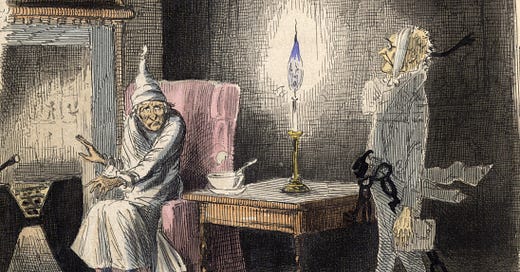




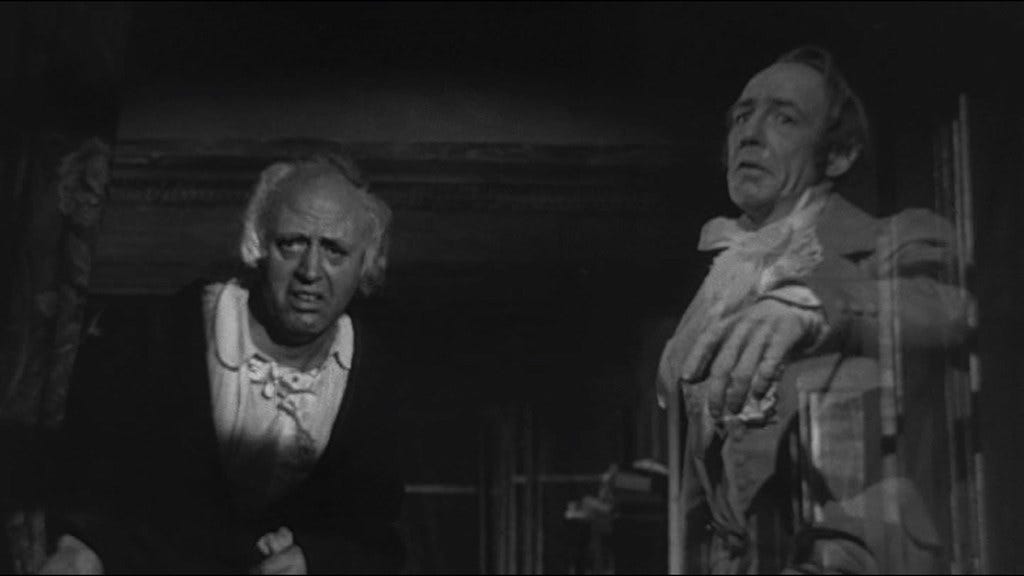


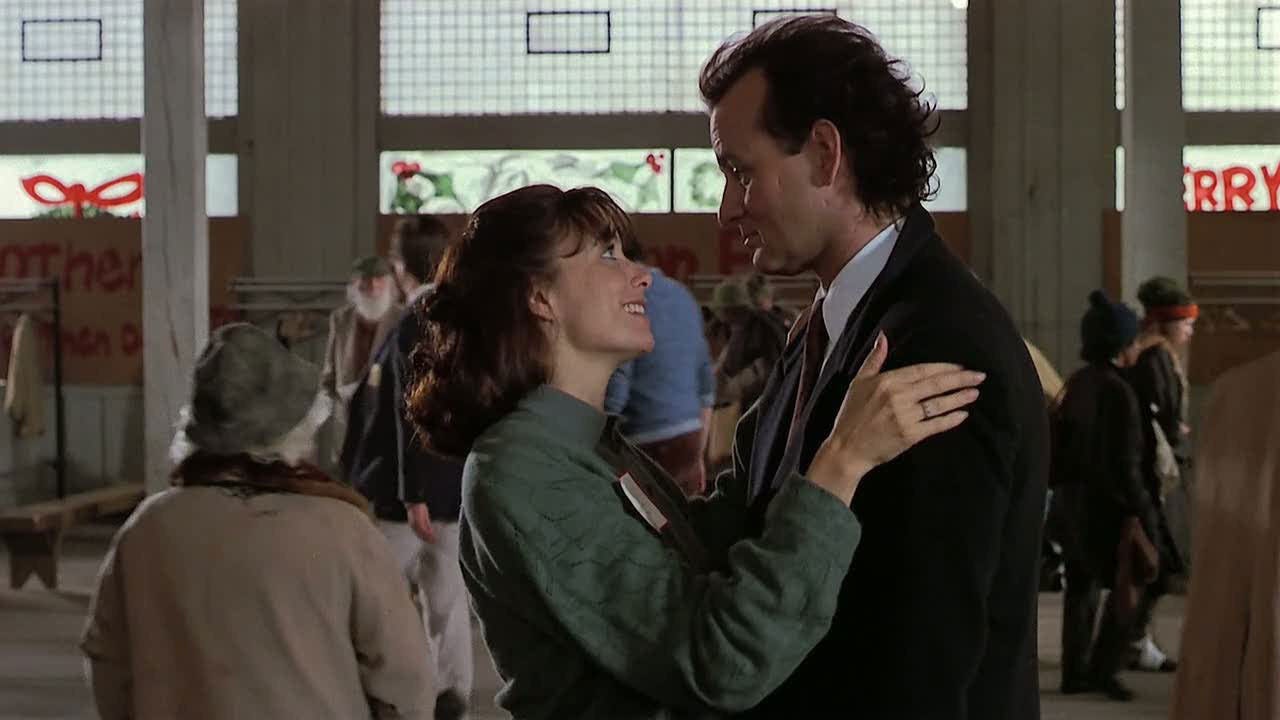
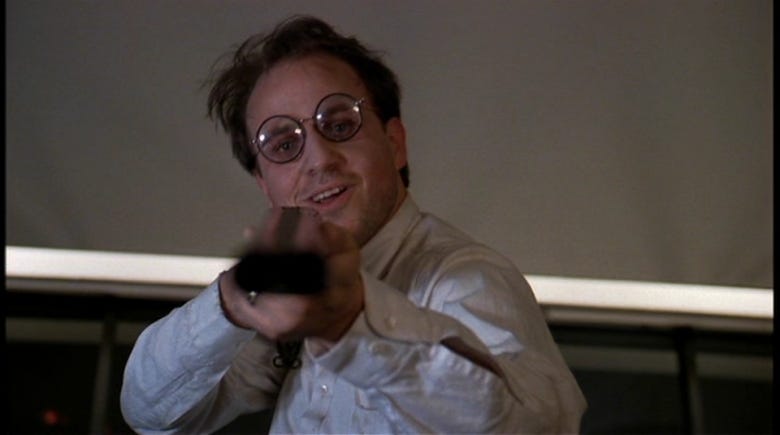
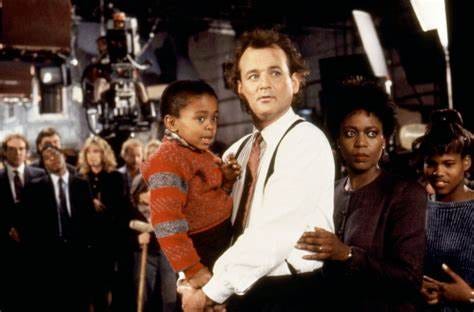
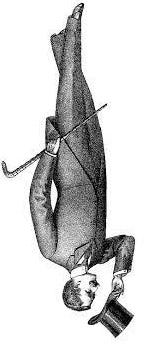
I've never seen any of these, so now I'll have to do some watching! Thanks!
At my house, the favorite Christmas movie of all time is "The Muppet Christmas Carol." We watch it every Christmas eve after a soup supper. Michael Caine is such a professional, and he gives a splendid performance even though he's playing to puppets. Definitely a treat.
"Scrooged" is my favorite of all the feel-good Christmas movies that I like:
https://moviewise.substack.com/p/feel-good-holiday-movies-just-for
It's so funny and charming!
Recently I was made aware that the "The Family Man" (2000) is a Christmas movie too, and in fact one could make the argument that it too is a rendition of "A Christmas Carol" in that the main character is made to remember the past, see a potential future, and has the opportunity to change his present:
https://moviewise.substack.com/p/want-more-people-to-like-you